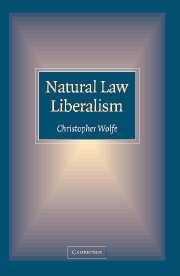Book contents
- Frontmatter
- Contents
- Acknowledgments
- Introduction
- PART I CONTEMPORARY LIBERALISM
- 1 Contemporary Liberal Exclusionism I: John Rawls's Antiperfectionist Liberalism
- 2 Contemporary Liberal Exclusionism II: Rawls, Macedo, and “Neutral” Liberal Public Reason
- 3 Contemporary Liberal Exclusionism III: Gutmann and Thompson on “Reciprocity”
- 4 Contemporary Liberalism and Autonomy I: Ronald Dworkin on Paternalism
- 5 Contemporary Liberalism and Autonomy II: Joseph Raz on Trust and Citizenship
- 6 “Offensive Liberalism”: Macedo and “Liberal” Education
- PART II LIBERALISM AND NATURAL LAW
- Index
1 - Contemporary Liberal Exclusionism I: John Rawls's Antiperfectionist Liberalism
Published online by Cambridge University Press: 24 July 2009
- Frontmatter
- Contents
- Acknowledgments
- Introduction
- PART I CONTEMPORARY LIBERALISM
- 1 Contemporary Liberal Exclusionism I: John Rawls's Antiperfectionist Liberalism
- 2 Contemporary Liberal Exclusionism II: Rawls, Macedo, and “Neutral” Liberal Public Reason
- 3 Contemporary Liberal Exclusionism III: Gutmann and Thompson on “Reciprocity”
- 4 Contemporary Liberalism and Autonomy I: Ronald Dworkin on Paternalism
- 5 Contemporary Liberalism and Autonomy II: Joseph Raz on Trust and Citizenship
- 6 “Offensive Liberalism”: Macedo and “Liberal” Education
- PART II LIBERALISM AND NATURAL LAW
- Index
Summary
The best-known version of liberalism today – indeed, the version that is often equated with liberalism simply – is John Rawls's antiperfectionist liberalism, developed in A Theory of Justice (1971) and Political Liberalism (1992). Rawls's theory of “justice as fairness” was a response to the perceived inadequacies of the previously dominant utilitarian theory, especially the insecurity of rights and instability of politics in a utilitarian system. In its final form, Rawls's philosophy claimed to be, not a neo-Kantian comprehensive liberalism – a specific “comprehensive” theological/philosophical position – but rather a “political liberalism” that was “neutral” with respect to fundamental comprehensive views. In the final analysis, however, it appears that Rawls was unable to vindicate this claim. Political liberalism is a form of comprehensive liberalism in the name of which a significant range of comprehensive views – especially traditional religious and moral views – are excluded from political life.
In this chapter, I begin with a summary of Rawls's political liberalism, which tries to identify what it seeks to achieve, and then explain why I think it is unsuccessful.
Rawls's Political Liberalism
Rawls begins with conceptions he considers implicit in our political culture. The first is that of citizens as free and equal persons, who have a capacity to understand and act on principles regulating a scheme of social cooperation and a capacity to develop, revise, and pursue rationally a conception of the good.
- Type
- Chapter
- Information
- Natural Law Liberalism , pp. 9 - 23Publisher: Cambridge University PressPrint publication year: 2006



